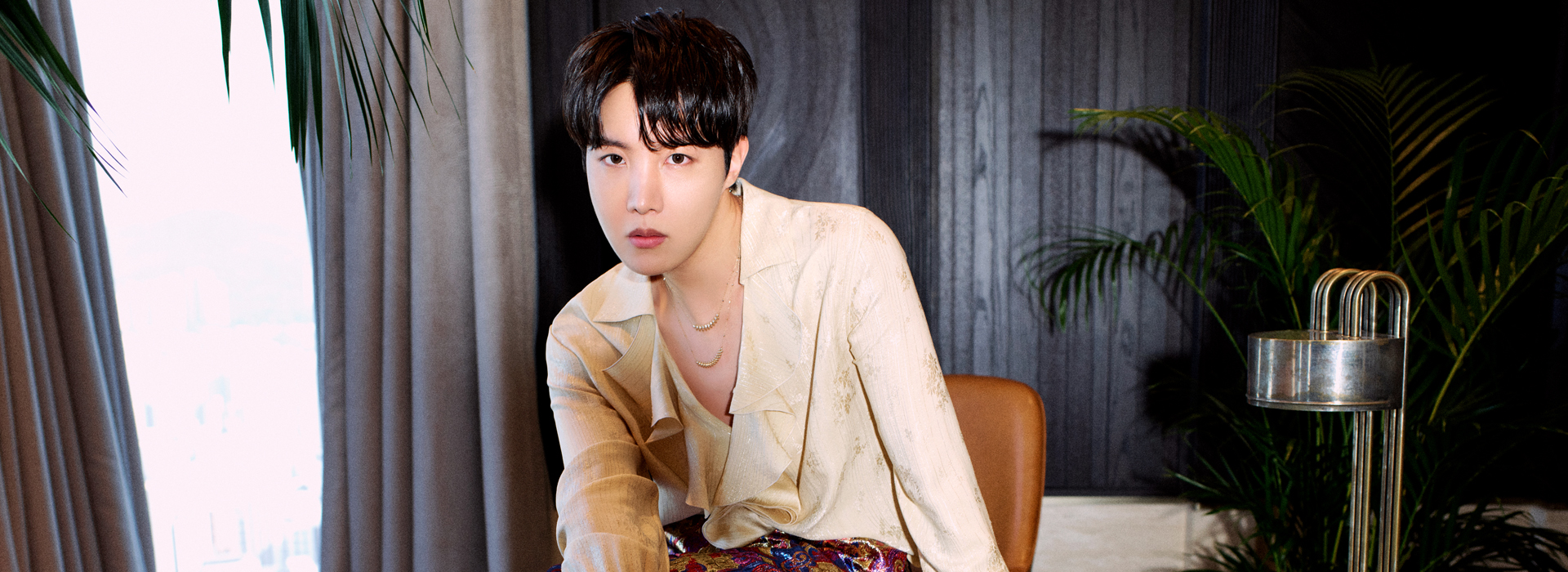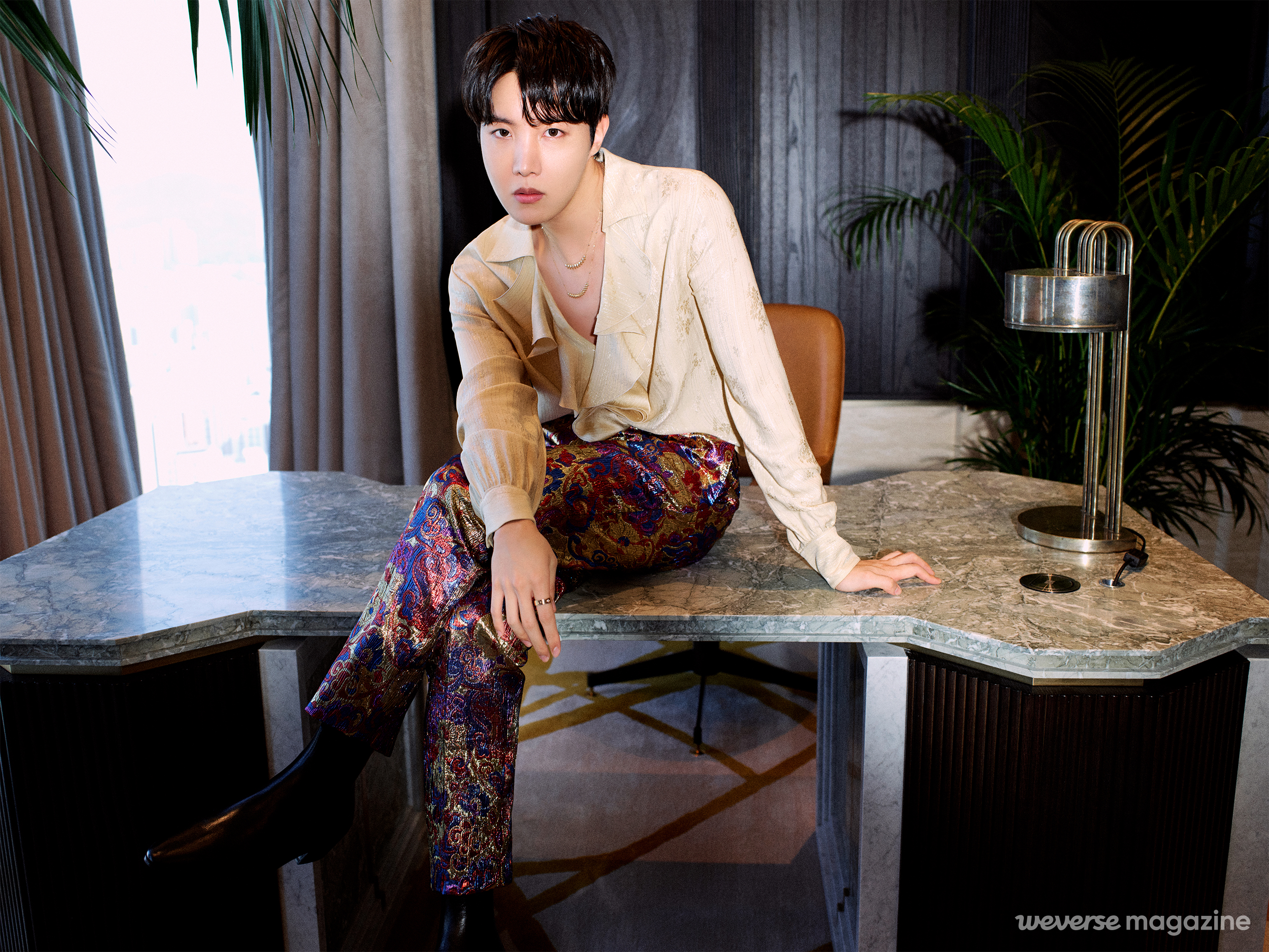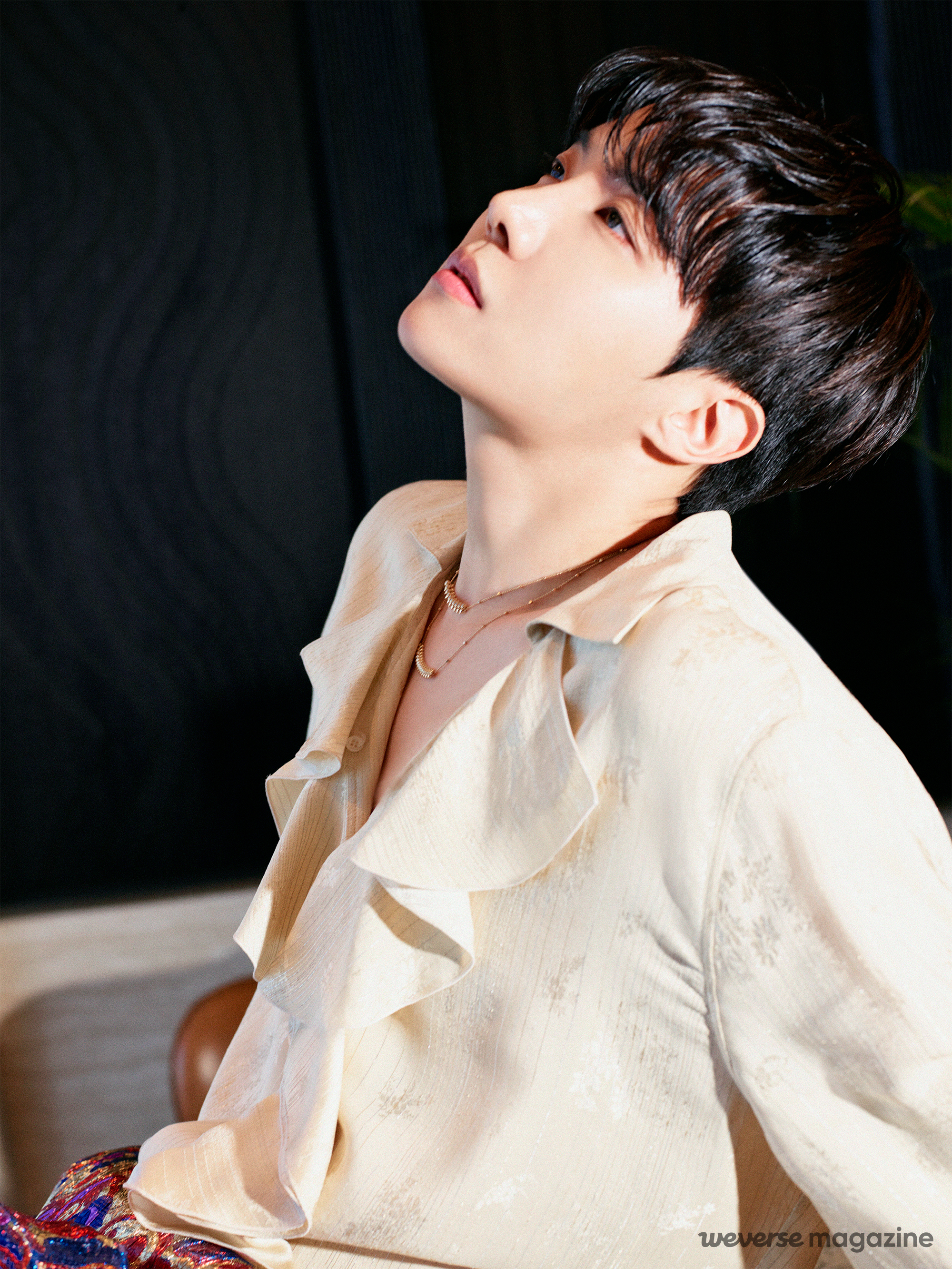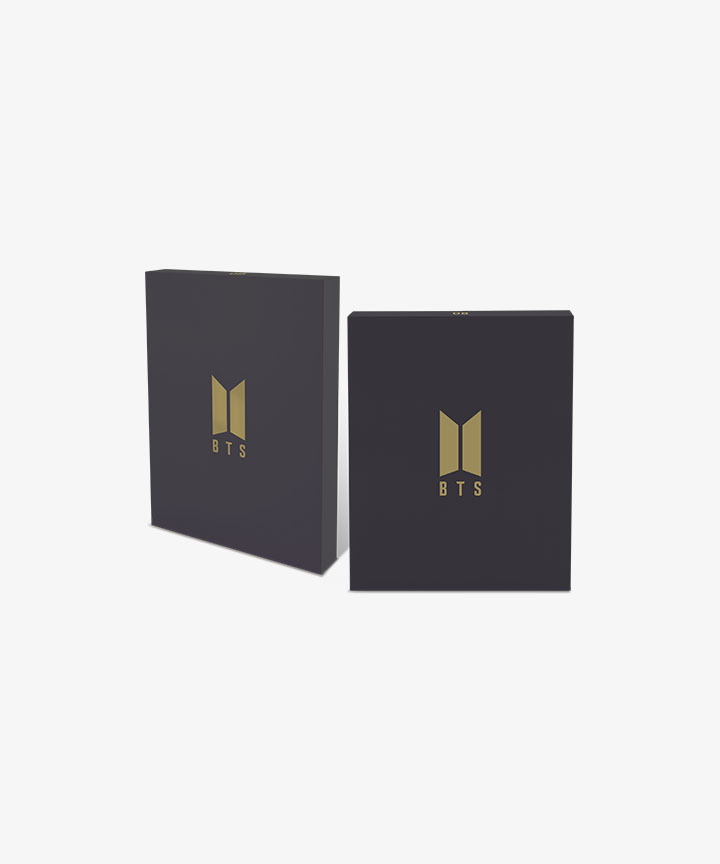
INTERVIEW
j-hope: “I’m going to look for the way that’s right for me”
BTS ‘Proof’ release interview
2022.06.13
On BTS’ j-hope, j-hope’s BTS, and j-hope himself.
-
 Pants by Dolce & Gabbana, necklace by Cartier.
Pants by Dolce & Gabbana, necklace by Cartier.
You just released Proof, a collection of different songs that capture the essence of BTS. How are you feeling?
j-hope: It did need to be organized at some point, didn’t it? By taking a look back on our timeline, we thought it was the right time to show people who recently became ARMY how we got to where we are today and show all the topics we’ve dealt with all in one place. And we think that it will also be an album that stirs up deep emotions for ARMY who have been with us from the beginning. Our timeline is basically ARMY’s timeline. We made this an album for ARMY who have taken this journey with us, one they would likely cherish, so we had a lot of fun revisiting old memories while making it.
The song “Run BTS” is itself a look back at the path BTS has taken. You give a shout-out to the other members, saying that they have all been through a lot. (laughs)
j-hope: They really did go through a lot. That’s a fact. (laughs) We all went through a lot and worked hard. So I compressed all those things into one word—gosaeng—to express it, and I put an “s” at the end to make gosaengs. We’ve conveyed many different messages with each of our albums, from “what’s your dream” in the “school trilogy” to now. But then I wondered, have I ever really conveyed a message to the other members? So, when we were working on the album, I told them I wanted to include something where I could speak my mind to the others. What came out of that process was “Run BTS,” and I wanted to give a shout-out in it to the other members.
Shouldn’t you also get a shout-out? Saying you went through a lot, too? (laughs)
j-hope: I have been through a lot, but I think I might be the one who gets the most enjoyment out of what BTS does. Because, through BTS, I can experience things that I would have questioned whether or not I could accomplish alone. We’ve done so many different kinds of performances on stage and tried and experimented with many things, too. So I’ve been taking a meaningful look back at all those times in the past. Everything, from learning, to mastering what I learned, to experiencing different cultures abroad, has been so fun.
The performance at the Grammy Awards must have been a new experience and experiment for you as well.
j-hope: It was an absolute whirlwind. After testing positive for COVID-19, it was only going to be possible to have exactly one day before the performance. I think making it to the Grammy Awards stage under those circumstances is what put me in the mindset I had for the performance. The other members were on the brink of mental exhaustion at that point, to be honest. Jin had injured his hand and practicing was a challenge, but I knew there was no way I couldn’t be there, so while practicing I kept telling myself I have to do this no matter what, went over on the plane, rehearsed on location, and somehow got it all together.
It was also a very technically difficult performance, wasn’t it? Even when you pulled off your jackets and tied them together, you only had one shot.
j-hope: It was a lot of pressure, psychologically speaking, as we were now at the Grammys and doing a performance similar to one we did shortly after we debuted. The idea behind the performance was for us to say, Let’s do this for them again. We can pull that kind of performance off at the Grammys—we’re BTS!
In a way, you traded the hat exchange you did in your first music show performance of “No More Dream” for throwing the card around at the Grammy Awards.
j-hope: That’s right. My heart was absolutely racing. I was disappointed in myself about the performance at the Grammys, to be honest. I wanted to put on a good show so badly that I couldn’t tolerate even the slightest letdown. So afterwards I thought, Oh, I really could have done better—I could have made it look cooler. That was a letdown.
But the other members talked about how much respect they had for you for the way you led practice. The nickname Team Leader Jeong would seem to show just how important you are within BTS.
j-hope: They’re just calling me that. (laughs) We were able to pull off a performance like this because of how well everyone did. That part’s extremely important. I learned a lot from being part of a team. I also wouldn’t settle for anything once I started working on songs for the group. Now when I work, I’m always discovering new ways to express myself and I think maybe it would be fun if I tried working it all out on my own someday. That’s how I can improve.
Speaking of improving, the way you change over the course of Proof is impressive. Your rap style has changed a lot. And you don’t usually use autotune, but you do on “Yet To Come.”
j-hope: I’m always picking up new techniques, and anytime I get a BTS song, I have an instinct about how I should go about it. There’s no particular reason change happens; I think everything I’ve ever learned and all the energy I’ve absorbed just instinctively comes out in the moment.
It was also new to hear you having such a long flow in “For Youth.” You take on a new style in each song with ease.
j-hope: “For Youth” was another chance for me to try something original. I thought of writing melodic rap and not concerning myself too much with the beat and wanted to show a somewhat more mature side of me. I’m constantly changing, musically maturing and the number of things I can express has increased. I think those things are how I express myself—by using things I learned throughout my life and during my time with BTS. While I was working on Proof, I could instinctively sense things like, This might not be interesting the way it’s going. It’s all because I’ve been with the group for a long time. That’s how I know what I need to do when it comes to music and performing. So I use autotune where needed or sometimes go with a different flow.
Has being in the group had any effect on your everyday life? You posted some fantastic pictures on Instagram. You took a collection of instant film photos and published them all together like a kind of exhibition.
j-hope: I think that was thanks to everything else I saw and what I learned from it. I think it’s become a habit to try and constantly show off everything I’ve learned. So I tried many different ways to see which would be interesting. I hope people found it interesting. (laughs)
If someone goes to your account, they can see all the instant photos you took in one glance, and if they look at each of them separately, they can see other related photos as well. For example, you posted a picture of just your clothes, followed by you wearing those clothes and living your normal, everyday life. It seemed to me like you were trying to express yourself visually.
j-hope: You’re right. Instant photos are one of the few means of keeping a record where only you get to hold onto the originals. Even though I was going to be sharing my everyday life through Instagram, I thought it would be nice to have a film copy that would belong to me and me alone, so I chose instant photos. So I posted them, but thought there’s a limit to what I can convey through analog alone, so now I’m covering my Instagram with photos that are more suitable for the modern era. I wanted to show casual photos I took of myself before in many cases, but now I want to show who I am as an artist, too. I want to use Instagram to show who I am as an artist and use Weverse to say the more honest and open things I want to say to fans. So maybe that’s the reason why my image on Instagram seems so different than before.
Does that interest extend to videos? Because you’re always filming and editing.
j-hope: One thing I’m really thankful for whenever they’re filming our group’s documentaries is, I think you could say, I’m living through the most beautiful moment in life right now. And I’m so grateful they’re keeping a record of that. They record what my life, my everyday, and my emotions while performing on stage are like. That’s the reason I place so much importance on record-keeping. And so I take a lot of photos and videos with my phone, but then my phone’s photo album becomes so chaotic. So I got around to editing to reduce the clutter. I usually make each file two or three minutes long.
Do you rewatch the videos you’ve taken sometimes?
j-hope: Yes. I watch them so, so much. (laughs) It’s so fun. Records like that remind me how I was feeling at the time I made them. I can remember what emotion I felt while taking a video or picture of some scenery or certain people—every single one. Like I’m reliving those feelings when I see what I was thinking in 2017 whenever I revisit them. I think there’s a limit to how much people can capture and store in their memories. I mean, you can’t remember everything, and you forget some things, too. But when I watch videos from back then, it’s like I’m smoothing out those wrinkled old memories and feelings. And I really love that.
What are those relived memories like?
j-hope: They’re beautiful. (laughs) I was younger and more full of vigor. It’s not that I’m not like that now—I just think there were definitely things I could only feel back then. One thing with Proof is it shows how I was working back then, the kind of music and performances I was doing and everything I achieved. Something that makes me say, I can remember those days, means so much to me.
There’s a demo version of “DNA” on Proof. That, too, shares a piece of history. How was it made?
j-hope: We were originally going to include a rough version of “Boy Meets Evil,” but listening to it now, I think, Wouldn’t it just be better to listen to the final recording? The rough version doesn’t really contain any of the charm you usually associate with the word “rough.” So instead, I went looking for something that would make ARMY think, You made this? And that’s when I found “DNA.” I listened to it, like, What is this? And then, Wow! (laughs) I was reminded of my process of working on the song.
What was your process like?
j-hope: The way we work, we take anything good any of us has worked on independently and use that, so first I tried making a whole song by myself. I tried working on “DNA” in a style I was capable of but I didn’t like the way it turned out, so I just kept it away in my hard drive for a while. Then I ended up coming across it again later on, and it’s definitely my unique sound, so I thought it really shows the raw originality. I thought it would be fun for ARMY to hear that there was a version of “DNA” like this before it was released.
A lot has changed between the days of the j-hope who made that version of “DNA” and the j-hope we have now. In what ways have you changed, exactly?
j-hope: A recent example would be the way all my time abroad has influenced me. You couldn’t pay to have the experiences I’m having now. We put on huge performances, meet all kinds of different artists, and learn about the culture.
You mentioned one of Lady Gaga’s performances on V LIVE before. How did her performance make you feel?
j-hope: I was so inspired by the performances in Las Vegas that I regretted not looking up more artists’ concerts while on our own tour before. Lady Gaga’s concert was particularly impressive. I’ve been a huge fan of Lady Gaga since I was young and I thought she was the best when it came to putting on a show. I was so inspired by how clearly dedicated she is to her performance. And Las Vegas is a show city, so I kept feeling like, I didn’t know this was even possible, while watching all the shows, and thought I’d like to try them with my own interpretation someday.
Don’t you ever feel burdened by some of the things you experience because you’re in BTS? I felt like giving speeches at the UN and performing there would be a great honor but potentially overwhelming at the same time.
j-hope: It was such an honor just being able to stand up there, but I’m honestly just an extremely ordinary person. I had a typical upbringing as a native of Gwangju so some things aren’t easy to embrace or get used to. Some things are too big for me and I end up with too much on my plate, but I think I’m able to embrace it eventually because it’s divided seven different ways. And I look at some of this as fate as well.
That makes me think of the way you talk back and forth with the other members on Instagram and tap “like” a lot. Is that a reflection of how much you all need each other?
j-hope: Oh, that. That’s because one of them always just happens to have posted something right before I open Instagram. (laughs) It’s amazing how that works. I’ll open Instagram and someone will have posted exactly three minutes earlier. When I see that, I tap the little heart. (laughs) I have a lot of fun doing that. I think checking out their daily lives there helps me find out things I didn’t already know about how they feel about their own lives.
You have been heavily influenced as a member of BTS while progressively changing as an individual artist. What would you like to express with your music or dancing these days?
j-hope: As you know, I often present myself with a sunny demeanor. So I have a strong desire to display a different side of me. I personally challenged myself to do that in my current projects. I wanted to show an extremely dark, raw side.
And why is that?
j-hope: In my time working and living, I figured out the stories I can tell are extremely limited when I only use my natural style or how people see me. I have things I want to say, but I kept feeling like, if I did them in the same style I always have, they wouldn’t come across well. If I was going to convey the things I wanted to say, I would have to be darker. It’s something I’ve never done before, so I was excited to try something new. I was heavily influenced by what my heart was telling me, and that’s why I decided to give it a try.
When it comes to BTS’ music, you decide what you need to do based on how things are flowing overall, whereas it seems like you call the shots in your solo work.
j-hope: When I look back now, I used the mixtape I released to show what I’m all about as j-hope, the member of BTS. I wanted to use the mixtape to paint a wider picture of the style I bring to the table within BTS. “Chicken Noodle Soup” showed that I could make something in that way, and now I’ve decided to show the kind of new musical direction and thoughts I have and how I can convey them in a new way. I think now I’m definitely continuing to craft the style I have within BTS as well as my own style I can show individually. I almost feel embarrassed calling myself an artist (laughs) but I think I’ve become the kind of artist who’s capable of that.
What is it you want to talk about, as a person and as an artist capable of all that?
j-hope: My own self. I wanted to look back on things, like how I’ve lived and the kind of emotional shadow my hidden side casts. You’ll understand when these songs come out later, but if I was going to discuss these things, I couldn’t always be light about it. That’s why I edged a little closer to a darker place, which I think allowed me to open up about my life story completely.
How far along in your life story do you think you’ve come now?
j-hope: I realized these days that I can’t always be a salmon, fighting against the current. (laughs)
What do you mean?
j-hope: I think a lot about how I should live my life just going with the flow. I make an effort to have a happy life according to what I’ve been given. To be honest, I tried to change a lot of things in 2020 and 2021—the many different things that happened, stemming from the pandemic. But the thing is, when I realized I couldn’t change all those things just by thinking about them, I thought about living according to what has already been given to me. Because I’m going to look for the way that’s right for me anyway. That doesn’t mean I’m going to stop. (laughs)
Credit
Article. Myungseok Kang
Interview. Myungseok Kang
Visual Director. Yurim Jeon
Project Management. Minji Oh
Visual Creative Team. Leehyun Kim(BIGHIT MUSIC)
Photography. Hyea W. Kang / Assist. Jisu Um, Yonguk Shin, Heehyun Oh, Chiho Yoon
Hair. Som Han / Assist. Hwa Yeon Kim, Seong Hyeon Hwang
Makeup. Dareum Kim / Assist. Yuri Seo, Sunmin Kim
Stylist. Youngjin Kim / Assist. Yesong Kim, Bongkyu Kim
Set Design. Darak(Seoyun Choi / Yehui Son, Ayeong Kim)
Artist Protocol Team. Shin Gyu Kim, Jin Gu Jang, Su Bin Kim, Jung Min Lee, Da Sol An, Jun Tae Park, Seung Byung Lee, Hyeon Ki Lee, Dae Seong Jeong, Ju Sang Lee
Copyright © Weverse Magazine. All rights reserved.
Unauthorized reproduction and distribution prohibited.
Unauthorized reproduction and distribution prohibited.


